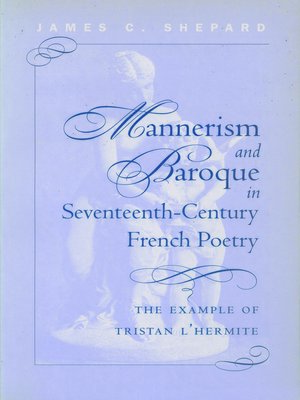Mannerism and Baroque in Seventeeth-Century French Poetry
ebook ∣ The Example of Tristan L'Hermite · North Carolina Studies in the Romance Languages and Literatures
By James Crenshaw Shepard

Sign up to save your library
With an OverDrive account, you can save your favorite libraries for at-a-glance information about availability. Find out more about OverDrive accounts.
Find this title in Libby, the library reading app by OverDrive.



Search for a digital library with this title
Title found at these libraries:
| Library Name | Distance |
|---|---|
| Loading... |
This book examines mannerism and baroque in the poetry of Tristan L'Hermite, a leading lyric poet of the seventeenth century. After presenting a history of scholarship on both the mannerist and baroque styles, James Shepard offers a definition of each as it applies to seventeenth-century lyric poetry. He then turns to Tristan's works, examining the poems contained in the Plaintes d'Acante et autres ouvres, Les Amours, La Lyre, and the Vers héroïques; his religious poetry; La Renommé; and his recently discovered poems.
Shepard reveals Tristan's amatory poetry to be mannerist and his heroic and religious poetry to be baroque. Many poems, however, contain elements of both styles. This supports Frank J. Warnke's theory that Baroque is the period style, with mannerism and baroque being two aspects of the period. Shepard also uncovers a baroque dompté style — the toned-down baroque that Helmut Hatzfeld and others argue characterized French classicism — in some of Tristan's heroic and religious poetry.
Shepard reveals Tristan's amatory poetry to be mannerist and his heroic and religious poetry to be baroque. Many poems, however, contain elements of both styles. This supports Frank J. Warnke's theory that Baroque is the period style, with mannerism and baroque being two aspects of the period. Shepard also uncovers a baroque dompté style — the toned-down baroque that Helmut Hatzfeld and others argue characterized French classicism — in some of Tristan's heroic and religious poetry.







